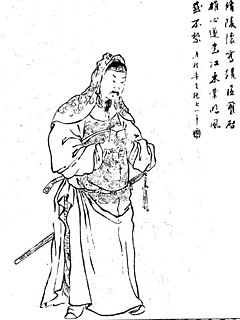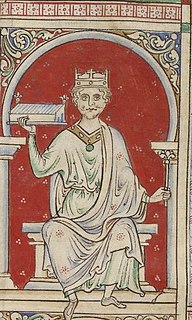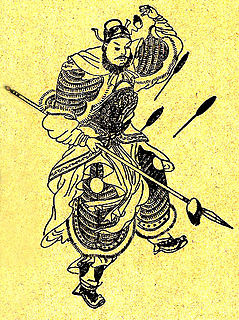 W
WAhab was the seventh king of Israel, the son and successor of King Omri and the husband of Jezebel of Sidon, according to the Hebrew Bible. The Hebrew Bible presents Ahab as a wicked king, particularly for condoning Jezebel's influence on religious policies and his principal role behind Naboth's arbitrary execution.
 W
WAlfonso V, called the Noble, was King of León from 999 to 1028. Enough is known of him to justify the belief that he had some of the qualities of a soldier and a statesman. Like other kings of León, he used the title emperor to assert his standing among the Christian rulers of Spain. He succeeded his father, Bermudo II, in 999. His mother Elvira García and count Menendo González, who raised him in Galicia, acted as his co-regents. Upon the count's death in 1008, Alfonso ruled on his own.
 W
WBagha Qaghan was the seventh ruler (587–589) of the Turkic Kaganate. He may have been the 'great kaghan' that was killed with an arrow by Persian commander Bahrām Chobin during First Perso-Turkic War. He is given as Chǔluóhóu (处罗侯) in Chinese records, and as Šāwa, Sāva, or Sāba in Sasanian-based sources. He was hunchback.
 W
WAgostino Barbarigo was a Venetian nobleman who served numerous administrative and military assignments for Venice, including Venetian Ambassador in France (1554-1557).
 W
WMiles FitzWalter of Gloucester, 1st Earl of Hereford was a great magnate based in the west of England. He was hereditary Constable of England and Sheriff of Gloucestershire.
 W
WGuillaume de Beaujeu, aka William of Beaujeu was the 21st Grand Master of the Knights Templar, from 1273 until his death during the siege of Acre in 1291. He was the last Grand Master to preside in Palestine.
 W
WHarald Sigurdsson, also known as Harald of Norway and given the epithet Hardrada in the sagas, was King of Norway from 1046 to 1066. In addition, he unsuccessfully claimed both the Danish throne until 1064 and the English throne in 1066. Before becoming king, Harald had spent around fifteen years in exile as a mercenary and military commander in Kievan Rus' and of the Varangian Guard in the Byzantine Empire.
 W
WHarold Godwinson, also called Harold II, was the last crowned Anglo-Saxon king of England. Harold reigned from 6 January 1066 until his death at the Battle of Hastings, fighting the Norman invaders led by William the Conqueror during the Norman conquest of England. His death marked the end of Anglo-Saxon rule over England.
 W
WQuintus Herennius Etruscus Messius Decius was Roman emperor in 251, ruling jointly with his father Decius. His father was proclaimed emperor by his troops in September 249 while in Pannonia and Moesia, in opposition to Emperor Philip the Arab. Decius defeated Philip in battle, and was then proclaimed emperor by the Roman Senate. Herennius Etruscus was elevated to caesar in 250, then further raised to augustus in May 251. When the Goths, under Cniva, invaded the Danubian provinces, Herennius Etruscus was sent with a vanguard, followed by the main body of Roman troops, led by Decius. They ambushed Cniva at the Battle of Nicopolis ad Istrum in 250, routing him, before being ambushed and routed themselves at the Battle of Beroe. Herennius Etruscus was killed in the Battle of Abritus the following year, alongside his father. After the deaths of both emperors, Trebonianus Gallus, who had been governor of Moesia, was elected emperor by the remaining Roman forces.
 W
WJosiah or Yoshiyahu was the sixteenth king of Judah who, according to the Hebrew Bible, instituted major religious reforms. Josiah is credited by most biblical scholars with having established or compiled important Hebrew scriptures during the "Deuteronomic reform" which probably occurred during his rule. Josiah became king of the Kingdom of Judah at the age of eight, after the assassination of his father, King Amon. Josiah reigned for thirty-one years, from 641/640 to 610/609 BCE.
 W
WMasrūq ibn Abraha was the Ethiopian ruler of Yemen under the Axumite Empire, as recorded in Arabic and Islamic traditions. He succeeded his father, Abraha. In 570, he was killed in the Battle of Hadhramaut in the Yemeni campaign of Wahriz, reportedly by an arrow shot by Wahriz himself. There are contradictory reports for the year of his death.
 W
WMatthew, Count of Boulogne, also known as Matthew of Alsace was the second son of Thierry, Count of Flanders and Sibylla of Anjou. Matthew forcibly abducted the nun Marie de Boulogne, daughter of Stephen, King of England, and constrained her into marriage, claiming the title of Count of Boulogne jure uxoris in 1160. The forced marriage was opposed by the Church and finally annulled in 1170, but he continued to rule as count until his death.
 W
WCura Ocllo was an Inca queen, the wife and sister of Manco Inca Yupanqui, puppet and later remnant ruler of the Inca Empire from 1533 until his death in 1544. Her husband was named Sapa Inca in October 1533 after the death of their common brother Túpac Huallpa, who in his turn had succeeded Atahualpa upon his execution by the Spaniards three months earlier.
 W
WPang Tong (179–214), courtesy name Shiyuan, was a Chinese politician. He was an adviser to the warlord Liu Bei in the late Eastern Han dynasty of China. In his youth, Pang Tong was disregarded because of his plain looking however Sima Hui highly esteemed him calling him "the crown of learned men in Jing Province". He studied under him along with Zhuge Liang, Xu Shu and Xiang Lang and was given the nickname of "Fledgling Phoenix". Because of his friendly attitude, he worked as an appraiser in Nan Commandery. When reviewing someone, he would prioritize their virtue over their abilities and would encourage them to help others.
 W
WRichard I was King of England from 1189 until his death in 1199. He also ruled as Duke of Normandy, Aquitaine and Gascony, Lord of Cyprus, and Count of Poitiers, Anjou, Maine, and Nantes, and was overlord of Brittany at various times during the same period. He was the third of five sons of King Henry II of England and Eleanor of Aquitaine and seemed unlikely to become king, but all his brothers except the youngest, John, predeceased their father. Richard is known as Richard Cœur de Lion or Richard the Lionheart because of his reputation as a great military leader and warrior. The troubadour Bertran de Born also called him Richard Oc-e-Non, possibly from a reputation for terseness.
 W
WEstácio de Sá was a Portuguese soldier and officer. Sá travelled to the colony of Brazil on the orders of the Portuguese crown to wage war on the French colonists commanded by Nicolas Durand de Villegaignon. These French colonists had established themselves in 1555 at Guanabara Bay in Rio de Janeiro, in a settlement known as France Antarctique. He was the founder of Rio de Janeiro, now the second largest city in Brazil.
 W
WSun Ce (175–200), courtesy name Bofu, was a Chinese military general, politician, and warlord who lived during the late Eastern Han dynasty of China. He was the eldest child of Sun Jian, who was killed during the Battle of Xiangyang when Sun Ce was only 16. Sun Ce then broke away from his father's overlord, Yuan Shu, and headed to the Jiangdong region in southern China to establish his own power base there. With the help of several people, such as Zhang Zhao and Zhou Yu, Sun Ce managed to lay down the foundation of the state of Eastern Wu during the Three Kingdoms period.
 W
WSun Jian (155–191), courtesy name Wentai, was a Chinese military general, politician, and warlord who lived during the late Eastern Han dynasty of China. He allied himself with Yuan Shu in 190 when warlords from eastern China formed a coalition to oust Dong Zhuo, a tyrannical warlord who held the puppet Emperor Xian in his power. Although he controlled neither many troops nor much land, Sun Jian's personal bravery and resourcefulness were feared by Dong Zhuo, who placed him among Yuan Shao, Yuan Shu and Liu Biao as the most influential men at that time. After the coalition disbanded in the next year, China fell into massive civil war. In 191, Sun Jian was killed in battle during an offensive campaign against Liu Biao.
 W
WWilliam II, the third son of William the Conqueror, was King of England from 26 September 1087 until his death in 1100, with powers over Normandy, and influence in Scotland. He was less successful in extending control into Wales. William is commonly referred to as William Rufus, perhaps because of his ruddy appearance or, more likely, due to having red hair as a child that grew out in later life.
 W
WZhang He, courtesy name Junyi, was a military general serving under the warlord Cao Cao in the late Eastern Han dynasty of China. He continued serving in the state of Cao Wei under its first two rulers, Cao Pi and Cao Rui, during the Three Kingdoms period until his death.